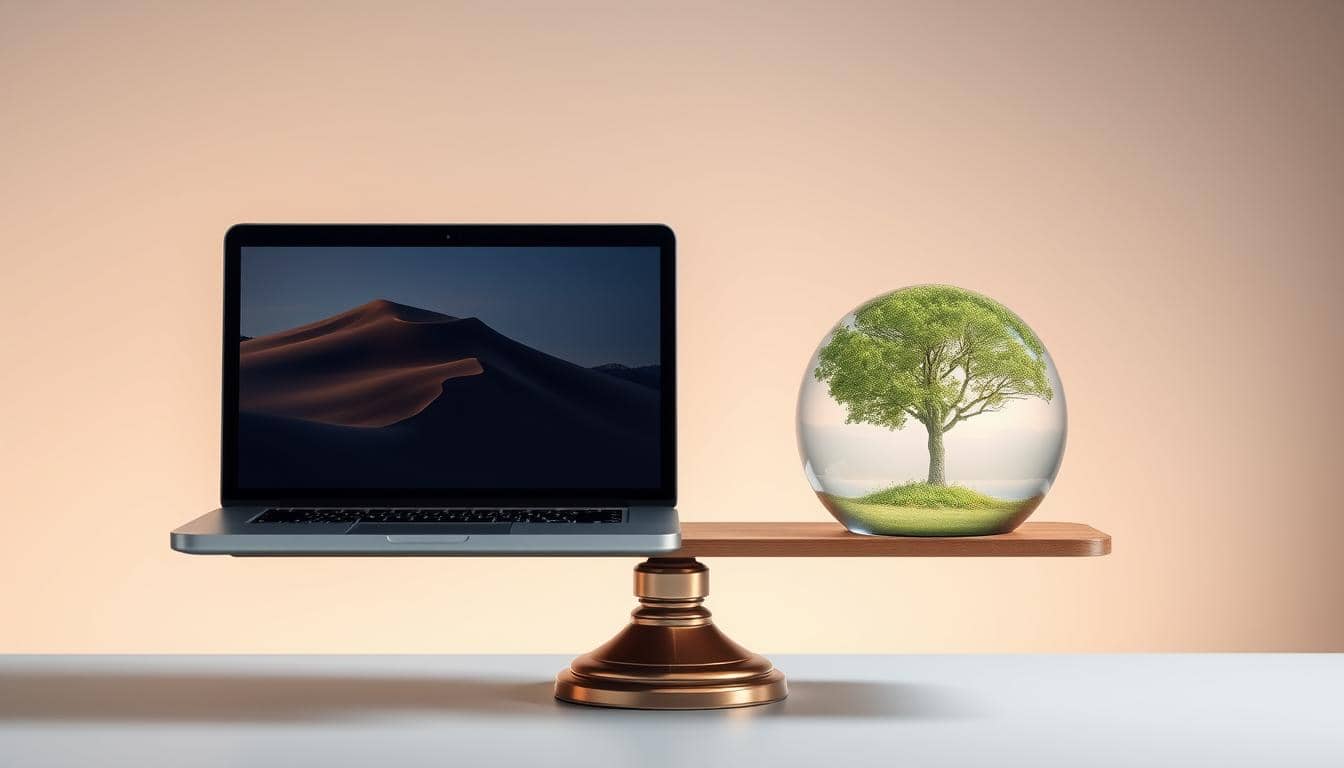In today’s fast-paced world, finding a balance between work and personal life is tough. Yet, it’s key for our well-being, productivity, and happiness at work. This article offers practical tips to help you manage this balance. It focuses on keeping your health, happiness, and fulfillment in check, both at work and at home.

- Understand the importance of work-life balance for physical and mental health, as well as increased productivity and job satisfaction.
- Learn how to prioritize self-care through effective time management, establishing boundaries, and incorporating healthy habits.
- Discover stress management techniques, such as mindfulness and meditation, to maintain a balanced lifestyle.
- Build a supportive network and pursue hobbies and interests outside of work to find joy and fulfillment.
- Explore flexible work arrangements, such as remote work and flexible schedules, to better accommodate personal responsibilities.
The Importance of Work-Life Balance
Keeping a healthy balance between work and life is key to our well-being. Without it, we face serious health issues. But, finding harmony between work and personal life brings many benefits, like better productivity and job happiness.
Impact on Physical and Mental Health
Work-life imbalance can harm our health. It can lead to high blood pressure, heart disease, and weakened immune systems. It also causes anxiety, depression, and burnout, affecting our life quality.
Increased Productivity and Job Satisfaction
Finding the right balance boosts our productivity and job satisfaction. A well-rested, energized, and focused person does better at work. They also feel more fulfilled, leading to better job performance and career growth.
In short, work-life balance is vital. It improves our health and boosts our career success and happiness.

Prioritizing Self-Care
In the quest for a healthy work-life balance, self-care is key. It’s vital to make time for preventive care and care for our mental health. This helps us manage stress and live a healthy lifestyle.
Self-care includes many activities that boost our physical, emotional, and mental health. It’s crucial to add these to our daily lives. This keeps our work-life balance strong and fulfilling.
- Try yoga, meditation, or a brisk walk to reduce stress and boost mental health.
- Make sure to get enough sleep and rest. This lets your body and mind recharge.
- Enjoy hobbies and activities that make you happy. They offer a break from work.
- Eat a balanced and nutritious diet. This gives your body the fuel it needs.
- Use mindfulness and relaxation techniques like deep breathing or meditation. They help you find inner peace.
By adding these self-care habits to your daily life, you’ll see better mental health and less stress. You’ll also feel more productive and satisfied at work.
| Self-Care Activity | Benefits |
|---|---|
| Regular Exercise | Stress relief, improved mental health |
| Adequate Sleep | Rejuvenation, cognitive function |
| Nutritious Diet | Sustained energy, physical well-being |
| Mindfulness Practices | Inner peace, emotional regulation |
Putting self-care first is essential for a balanced life. By focusing on your mental health and healthy lifestyle, you’ll handle work and personal life better. This leads to a more fulfilling and productive life.

Setting Boundaries and Time Management
To keep a healthy work-life balance, you need clear boundaries and good time management. Set specific work hours and learn to step away from work when you’re off. This boosts your productivity and happiness.
Establishing Work Hours
Setting regular work hours is crucial for a better balance. Pick a schedule that fits your life and stick to it. You might start and end work at the same time every day or set times for work and breaks.
Tell your team and clients about your hours. This helps them know when to reach you and lets you rest.
Unplugging from Work
In today’s world, it’s easy to stay connected to work all the time. Make a plan to disconnect during personal hours. Turn off notifications, silence work devices, or set email response times.
Setting these limits helps you fully disconnect. It keeps work from taking over your personal time.
With clear boundaries and good time management, you can achieve a work-life balance. This balance supports your productivity, happiness, and job satisfaction.
| Strategies for Setting Boundaries | Techniques for Effective Time Management |
|---|---|
|
|
“The key is not to prioritize what’s on your schedule, but to schedule your priorities.” – Stephen Covey
Health & Wellness: Incorporating Healthy Habits
Keeping a healthy work-life balance is key for your well-being. Adding healthy habits to your day can help a lot. Eating right and exercising regularly can boost your health and job happiness.
Nutritious Diet and Hydration
Eating a balanced diet is vital for energy all day. Eat lots of fresh fruits, veggies, whole grains, lean proteins, and healthy fats. Drinking water also boosts your brain and body.
- Prioritize a diet rich in nutrient-dense foods
- Limit processed and high-sugar items
- Establish a healthy hydration routine
Regular Exercise Routine
Exercise is great for your body and mind. It can be a walk at lunch, yoga in the morning, or a workout after work. It reduces stress, improves mood, and boosts productivity.
- Find an exercise routine that you enjoy and can commit to
- Aim for at least 30 minutes of moderate activity per day
- Explore a variety of activities to prevent boredom
By focusing on a healthy lifestyle, you support your work-life balance. A good diet, staying hydrated, and regular exercise lead to better health and wellness.
| Healthy Habit | Benefits |
|---|---|
| Nutritious Diet | Increased energy, better focus, and improved overall health |
| Hydration | Enhanced cognitive function, muscle recovery, and temperature regulation |
| Regular Exercise | Reduced stress, improved mood, and increased productivity |
Stress Management Techniques
In today’s fast-paced world, managing stress is key to a healthy life. There are many ways to handle stress and stay mindful. These methods help us deal with work and personal life challenges.
Mindfulness and Meditation
Mindfulness and meditation are powerful tools against stress. They help reduce anxiety and improve focus. By staying present and observing thoughts, we gain control over stress.
- Mindfulness meditation: Focuses on the breath or body to find calm and awareness.
- Guided meditation: Uses audio or video to guide through meditation, adding visualizations or affirmations.
- Breathing exercises: Simple deep breathing activates the relaxation response, lowering stress.
Adding mindfulness and meditation to your day can greatly improve stress management, mental health, and well-being.
“Meditation is not about becoming a different person, a new person, or even a better person. It is about training in awareness and getting a healthy sense of perspective. You’re not trying to improve or change yourself, you’re just trying to get a deep sense of acceptance of who and what you already are.” – Pema Chödrön
Building a Support System
Keeping a healthy work-life balance is more than just time management. It’s also about having a supportive network around you. A strong support system greatly impacts your mental health and overall well-being.
At work, building positive relationships with colleagues is key. They can offer a listening ear, help with tasks, and even share advice on work challenges. This creates a supportive team atmosphere, not just a job.
Outside of work, having family and friends who support you is crucial. They provide a break from work stress and help keep your life balanced. Regular dinners or calls with loved ones greatly improve your mental health and happiness.
“A strong support system is not just a nice-to-have, it’s a necessity for maintaining a healthy work-life balance and thriving both personally and professionally.”
Your support system is about more than just having people around. It’s about building meaningful relationships that offer emotional, practical, and social support. By investing in these connections, you create a strong base for a fulfilling life.
| Type of Support | Benefits |
|---|---|
| Emotional Support | Provides a sense of belonging, reduces feelings of isolation, and helps manage stress and anxiety. |
| Practical Support | Offers assistance with tasks, responsibilities, and problem-solving, alleviating the burden of your workload. |
| Social Support | Fosters a sense of community, facilitates social engagement, and encourages a healthy work-life balance. |
Pursuing Hobbies and Interests
In today’s fast world, it’s easy to get lost in work. But, keeping a balance between work and life is key to our happiness. One great way to do this is by focusing on our hobbies and interests outside of work.
Doing things that make us happy can greatly improve our mental health and balance. Whether it’s learning a new skill, exploring a creative side, or enjoying a favorite hobby, these activities offer a much-needed break from work stress.
The Benefits of Hobbies and Interests
Having hobbies and interests outside of work brings many benefits, including:
- Reduced stress and anxiety
- Improved creativity and problem-solving skills
- Increased sense of personal fulfillment and happiness
- Enhanced social connections and relationships
- Better overall physical and mental health
When we do things we love, we find joy and happiness. This joy can also improve our work performance. It can make us more productive, make better decisions, and handle work demands better.
Remember, finding happiness outside of work is essential, not a luxury. By making our hobbies and interests a priority, we can live a more balanced and fulfilling life. This improves our overall well-being and work-life harmony.
Flexible Work Arrangements
In today’s changing work world, flexible work options are becoming more common. They help employees balance work and personal life better. These choices, like remote work and flexible hours, are changing the traditional work culture. They lead to better work-life balance, more productivity, and a more positive work culture.
Remote Work and Flexible Schedules
Remote work has changed the game, letting people work from home or their favorite spots. It cuts down on commuting time and stress. It also helps manage personal tasks better. Flexible schedules let workers adjust their day to fit their needs.
- Improved work-life balance: Remote work and flexible hours give more control over time. This reduces stress from balancing work and personal life.
- Enhanced productivity: Research shows remote or flexible work leads to better focus and productivity. This results in higher performance.
- Fostering a positive work culture: Flexible work options help create a culture that values trust, autonomy, and work-life harmony.
| Benefit | Remote Work | Flexible Schedules |
|---|---|---|
| Work-Life Balance | ✓ | ✓ |
| Productivity | ✓ | ✓ |
| Work Culture | ✓ | ✓ |
As companies adopt these flexible work options, employees can enjoy a more balanced and rewarding life. Both at work and at home.
Balancing Parental and Family Responsibilities
Keeping a good work-life balance gets harder when you have family duties. It’s easy to get overwhelmed by work and family tasks. But, with the right approach and support, you can balance your work and family life well.
Involving Family in Work-Life Balance
Getting your family involved is key to balancing work and family. Talk to your spouse or family about your work-life balance needs. Share tasks and create a supportive space for both work and family.
- Have open talks with your family about work-life balance and how they can help.
- Split household and childcare tasks fairly to share the load.
- Make sure your family respects your work-life balance time, like work hours and personal time.
- Ask for help from family, friends, or childcare services when you need it.
When your family is part of the work-life balance plan, everyone benefits. A strong support system is vital for parents and those with family duties to succeed in work and life.
Continuous Evaluation and Adjustment
As you work towards a better work-life balance, regular self-reflection is key. Your life and needs can change, so a fixed plan won’t work.
Being adaptable is crucial. Check your strategies often and ask for feedback from others. Are your work and personal life boundaries working? Are you spending enough time on what you love? It’s okay to change your approach to fit your life better.
- Regularly review your work-life balance practices and make adjustments as needed.
- Seek feedback from trusted sources to identify areas for improvement.
- Remain open to trying new approaches that foster continuous improvement.
Getting a good work-life balance is a journey, not a goal you reach once. By always looking inward and being ready to change, you’ll handle life’s ups and downs better.
| Key Strategies for Continuous Evaluation and Adjustment | Benefits |
|---|---|
| Regular self-assessment | Identify areas for improvement and adapt accordingly |
| Seeking feedback from others | Gain valuable insights and perspectives |
| Embracing a mindset of continuous improvement | Ensure your work-life balance strategies remain effective over time |
“The secret of change is to focus all of your energy, not on fighting the old, but on building the new.”
We’ve looked at why a healthy work-life balance is so important. By taking care of yourself, setting limits, and practicing wellness, you can improve your health and happiness. You’ll also work better and enjoy your job more.
Using time wisely, being mindful, and enjoying hobbies outside work can help you balance your life. It’s also key to have a supportive network. This could be through flexible work or involving family in your work-life balance.
Starting a journey towards a better lifestyle is exciting. Remember, success comes from always checking in and making changes. This way, you keep your work-life balance in line with your changing needs and goals. Focus on your well-being, work better, and live a more fulfilling life.
FAQ
What are the key benefits of maintaining a healthy work-life balance?
A healthy work-life balance improves your physical and mental health. It boosts productivity and job satisfaction. It also reduces stress and enhances overall well-being.
How can I prioritize self-care in my daily routine?
To prioritize self-care, take regular breaks and get enough sleep. Engage in activities that reduce stress. Also, eat well and exercise regularly.
What are some effective strategies for setting boundaries and managing time?
Set clear work hours and unplug from work outside those times. Use productivity tools to manage your time better.
How can I incorporate stress management techniques into my life?
Practice mindfulness and meditation to manage stress. These activities help maintain a healthy work-life balance.
Why is it important to build a strong support system?
A strong support system provides emotional and practical help. It offers a sense of community, essential for a healthy work-life balance.
How can I balance my parental and family responsibilities with my professional commitments?
Involve your family in your work and life. Delegate tasks and create a supportive environment. This helps balance work and family life.
How can I continuously evaluate and adjust my work-life balance strategies?
Regular self-reflection and feedback are key. Be open to changes as your needs evolve. This ensures your strategies stay effective.

